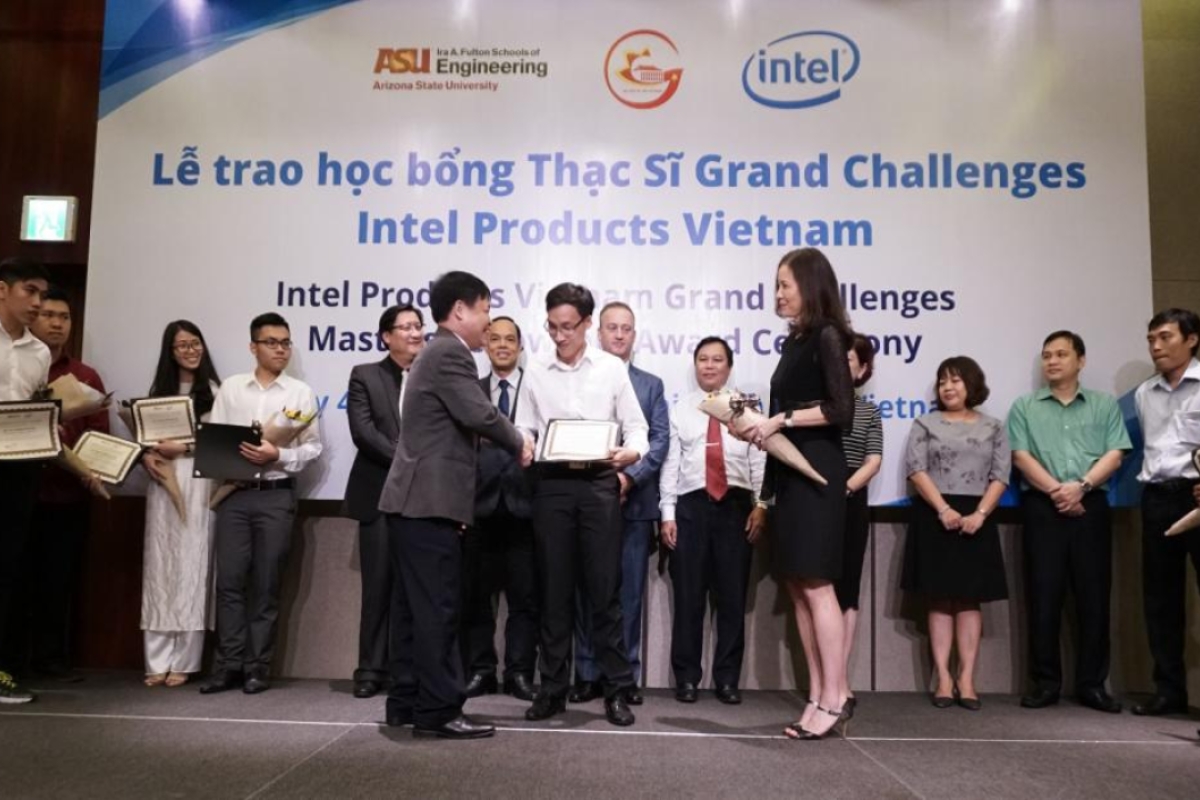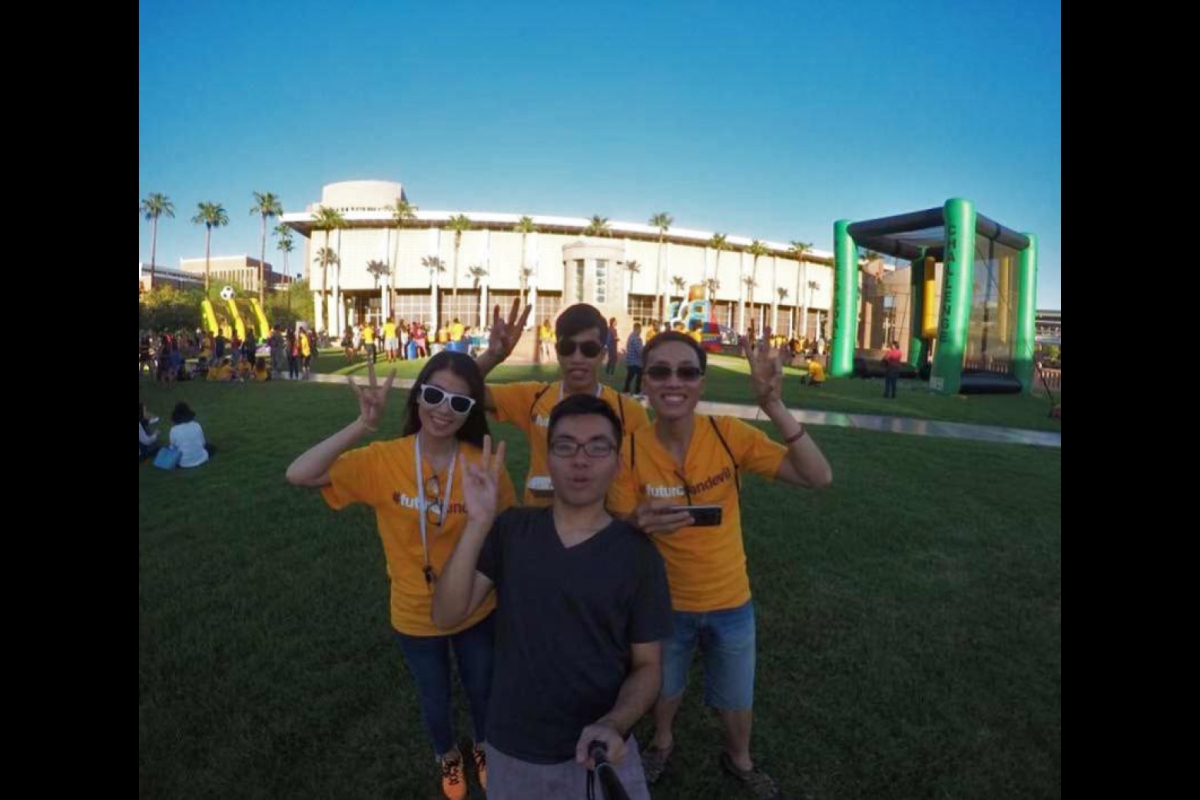Vietnamese scholars study at ASU to advance Ho Chi Minh City’s Smart City efforts

Six Vietnamese scholars arrived at Arizona State University in August to study in Ira A. Fulton Schools of Engineering master’s programs as part of the Intel Grand Challenge Master’s Fellowship program facilitated by ASU’s Higher Engineering Education Alliance Program. Pictured are five of the students arriving at Phoenix International Airport on August 7. Photo courtesy of Angela Harguess
A recent $1 million investment from Intel Products Vietnam helped Arizona State University to sponsor six Vietnamese scholars for one-year master’s fellowships to speed the transformation of Ho Chi Minh City (HCMC) into an innovative Smart City by 2025.
Facilitated by Arizona State University's Higher Engineering Education Alliance Program known as HEEAP, the Intel Grand Challenge Master’s Fellows began their studies within graduate engineering programs at ASU’s Ira A. Fulton Schools of Engineering in August 2017.
Nguyen Quang Hung is studying chemical engineering, Dao Doan Duy is studying environmental resource management, Hoang Thi Khanh Ha and Ho Hoang Hai Nam are studying materials science and engineering, Le Phuoc Tri is studying solar energy engineering and commercialization, and Pham Quoc Thai is studying civil, environmental and sustainable engineering.
“I chose chemical engineering to dig deeper into the industry and learn more about using chemistry to solve environmental and energy problems,” said Hung, who studied analytical chemistry at Vietnam National University Hanoi University of Science prior to this fellowship. “I hope that I can manage to help Ho Chi Minh City to build modern systems regarding wastewater treatment, air quality control and food quality control.”
As part of their efforts to advance Ho Chi Minh City to become a Smart City, fellows will work on an applied project to develop their skills. After they finish the program by August 2018, fellows will return to Vietnam and begin work on Smart City projects for the HCMC government for at least three years.
“I am really honored,” Ha said about the opportunity to work on HCMC’s Smart City projects. “I want to be at ASU to learn more new things and then come back and contribute my ability to operate this project. I believe that this project will help my country increasingly become modern and developed.”
All six fellows are excited about their time at ASU.
“ASU is No. 1 in innovation, and I also know that there are a lot of internet of things systems facilitating students around campus,” Thai said. “I think that ASU’s campus can be seen as a small Smart City. ASU also has many labs and clubs related to smart sensor applications where I can discover more about the internet of things.”
Recent Vietnamese bachelor’s degree graduates whose engineering-related studies focused on Smart City design were eligible for the fellowships. The final six scholars were recommended by their dean or department chair, met standard ASU admission requirements and were chosen based on their undergraduate GPAs, GRE scores, English proficiency and interviews with the HCMC People’s Committee, Intel and ASU.
“It has been an honor to collaborate with Intel Products Vietnam and the Ho Chi Minh City People’s Committee,” said Jeff Goss, associate vice provost for SE Asia Programs at ASU. “This fellowship will help to further the development and decide of HCMC into one of the world’s premier Smart Cities.”
Founded in 2010, HEEAP is a collaboration of academic, government and corporate partners in the United States and Vietnam whose goal is to improve the quality of higher engineering education and technical vocational programs in Vietnam — a country that is quickly becoming a hub of innovation. Applied and hands-on workshops HEEAP offers at ASU and abroad help to create work-ready graduates with applied technical skills needed by industry.
HEEAP has previously supported fellowships at ASU to help female faculty at partner universities extend their master’s education. During the 2016–17 academic year, HEEAP facilitated the Advancing Women in Engineering Fellowship, a one-year opportunity for Vietnamese female students to earn their master’s degree in electrical engineering, mechanical engineering or information technology at ASU.
More Science and technology

Cracking the code of online computer science clubs
Experts believe that involvement in college clubs and organizations increases student retention and helps learners build valuable…
Consortium for Science, Policy & Outcomes celebrates 25 years
For Arizona State University's Consortium for Science, Policy & Outcomes (CSPO), recognizing the past is just as important as…

Hacking satellites to fix our oceans and shoot for the stars
By Preesha KumarFrom memory foam mattresses to the camera and GPS navigation on our phones, technology that was developed for…

